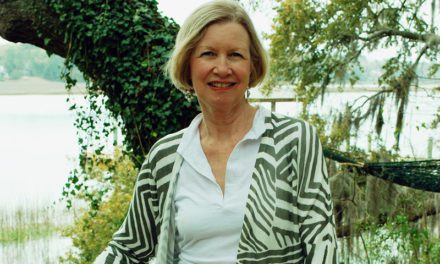 By Margaret Evans, Editor
By Margaret Evans, Editor
It’s starting.
Political yard signs are beginning to appear in my neighborhood. They seem to be springing up overnight like mushrooms after a rain.
This fact should come as no great surprise – there’s an election in November, after all – but for some reason, it’s been a shock to my lockdown-weary, media-saturated system. I’ll be out for my morning walk, listening to a podcast, or maybe some music – pondering the enduring beauty of cardinals or the endless audacity of squirrels – when suddenly, WHAM. A campaign sign.
Cue the record scratch.
Ours is a wonderfully “mixed” neighborhood – ethnically, economically, and, yes, politically. I am seeing Trump signs and Biden signs on the same block. As a chronic centrist, this warms my heart, even as it sets off some internal alarm I can’t quite articulate.
I’m old enough to remember a time in this country when politics felt more like a friendly rivalry than a death match. Seeing yard signs in the neighborhood was exciting – a reminder of our vigorous, healthy democracy – and election season was fun. In my Alabama childhood, Republicans and Democrats were kind of like ‘Bama and Auburn fans; they pulled hard for their respective teams, but at the end of the game, they shook hands, grabbed another beer, and fired up the grill together.
Election season hasn’t felt that way in a long time – not to me, anyway – and I’m pretty sure that has something to do with social media. With each passing year, people become more aggressive in their online commentary, less sensitive to the feelings of their virtual neighbors. No longer content to criticize policy and ideology, many people now delight in ripping a politician for his looks and personality. And no longer limiting those rips to the politician himself, they ruthlessly mock and deride the politician’s supporters. I don’t think I’ll ever get used to seeing adults openly demeaning other adults – their so-called Facebook “friends” – with language so foul they’d surely punish their kids for using it.
By now, most partisans have heard what folks on the “other team” think of them – in no uncertain terms, ad nauseam – and I don’t see that it’s done our union any good.
So, what does any of this have to do with yard signs? Well, it’s one thing to know that your virtual neighbors see you as one of the “bad guys” because of your politics. It’s quite another to receive that message – in big, bold print – from your actual neighbors. In 2020 America, you can be fairly certain that your yard sign feels like fightin’ words – even a slap in the face – to at least some of your neighbors, whether you mean it that way or not.
There are two houses across the street from each other, a couple of blocks from mine. In one yard sprout signs touting Democratic congressional candidates Jaime Harrison and Joe Cunningham. Across the street, a Trump flag waves in the breeze. I don’t know the residents of these houses – both are semi-new to the community – but I find myself imagining all manner of tense “neighborly” encounters while walking by those houses each morning.
Because let’s face it, this is not your grandfather’s, or even your father’s, election season. And I know, I know . . . we said that in 2016. How innocent we were back then.
In a June article for Byline Times entitled “Is the United States on the Brink of Another Civil War?” CJ Werleman worries that our troubled country is awash in 300 million guns and plenty of ammo to go with them.
“More worrying, however,” he writes, “is the fact that political polarization has reached levels not seen in the US since the Civil War of the 1860s. The divide between left and right has been widened by cable television news outlets, social media platforms and a President who sees his path to electoral victory in cornering 40% of the country . . .
“For Republican voters, the left represents a lethal threat to their cultural values, including religion, individualism, and nativism. For Democratic voters, the right represents a mortal threat to theirs, including secularism, collectivism and multiculturalism. All forms of violent extremism are rooted in this form of in-group versus out-group thinking. Neither side can imagine surviving the duration of two presidential terms with their party out of political power, which makes dialogue and compromise impossible. As the 19th Century Prussian general Carl von Clausewitz opined: ‘War is the continuation of politics by other means.’”
Surely he’s exaggerating, right? Another American civil war? In the enlightened year of 2020? Ridiculous! But Werleman’s is just one of many such articles I’ve come across lately. In the summer of George Floyd and Covid 19, war talk is all the rage, and when you look at what’s actually been happening – in cities and boardrooms and universities across the country – it doesn’t seem so far-fetched.
Writing for the July/August issue of Commentary magazine, Abe Greenwald skips the civil war talk, arguing, instead, that we’re in the midst of a Revolution, complete with – but by no means limited to – violence in the streets.
“For partisans, it often feels as if everything stands or falls on the ideological battles of the day,” he writes. “But this is different. This is objectively real, and it’s remaking the nation before our eyes. We know it’s different this time because the stakes are continually articulated by the enemies of the current order. They are demanding, and in some cases getting, a new and exotic country. The police are indeed being defunded. The statues are coming down. The heretics are being outed. The dissenters are being silenced. The buildings are burning, and the demands are ever growing.”
Greenwald’s article is either thrilling or chilling, depending on how you feel about the “current order.” I know my own heart and mind – I am a reformer, not a revolutionary – but your mileage may vary. In either case, I respect your right to uphold your position. I find that revolutionaries seldom return that favor. Revolutions aren’t about compromise or accommodation; they’re about winning. Out with the old and in with the new, no matter the cost.
If, indeed, a revolution is upon us, I just hope the baby survives the ousting of the proverbial bathwater. We shall see.
The yard signs are going up. November is coming. Pollsters are making their forecasts, but in a country where almost 60% of the citizens are now afraid to speak their political views aloud, nobody can predict the future with certainty.
It’s election season in 2020 America. Would that our nation felt more like a neighborhood and less like a war zone.








